COVID-19 Predictions in Croatia by IHME: Over 1,000 Deaths by January
September 4, 2020 - The Independent Institute of Health Metrics and Assessments (IHME) in Washington has published the latest COVID-19 predictions in Croatia, which are quite grim.
Slobodna Dalmacija reports that the current death toll from COVID-19 in Croatia is 194, and IHME predicts that there will be 225 deaths in Croatia by October 1, 2002.
In compliance with the current epidemiological measures or if they are mitigated, they expect that by January 1, 2021, an average of 52 infected people will die daily in Croatia. By the same date, they predict that there will be 1,267 deaths in the country.
The model also envisages a situation in which everyone would adhere to the mandatory measure of wearing masks in public, and that in that case, there would be 230 deaths in Croatia by January 230.
They also calculated that we would need almost 2,000 hospital beds for the patients at the beginning of next year and as many as 493 ventilators.
The projections are made according to the latest data from the World Health Organization (WHO) and are subject to change depending on the epidemiological situation in the country.
Although this scenario seems very pessimistic, let us hope that IHME may have overestimated the death toll this time as it happened in their previous projection.
Namely, the institute has already corrected their projections for Croatia this summer.
Thus, in the first wave of the pandemic, they estimated that Croatia would have about 166 deaths, or about sixty more than actually died.
Shortly afterward, they corrected the projections and predicted that there could be 122 COVID-19 deaths by early October. The calculation model was changed after Nenad Bakic objected to the institute, and was supported by Nobel laureate Michael Levitt.
For the latest travel info, bookmark our main travel info article, which is updated daily.
Read the Croatian Travel Update in your language - now available in 24 languages
PHOTOS: Pula Amphitheatre and Zagreb Arena Lit Red for Events Industry
September 3, 2020 - Three of Croatia's most internationally famous venues in the events industry were lit in spectacular red on Monday. Pula amphitheatre, Zagreb Arena and Fort Punta Christo were bathed in light from sunset until after dark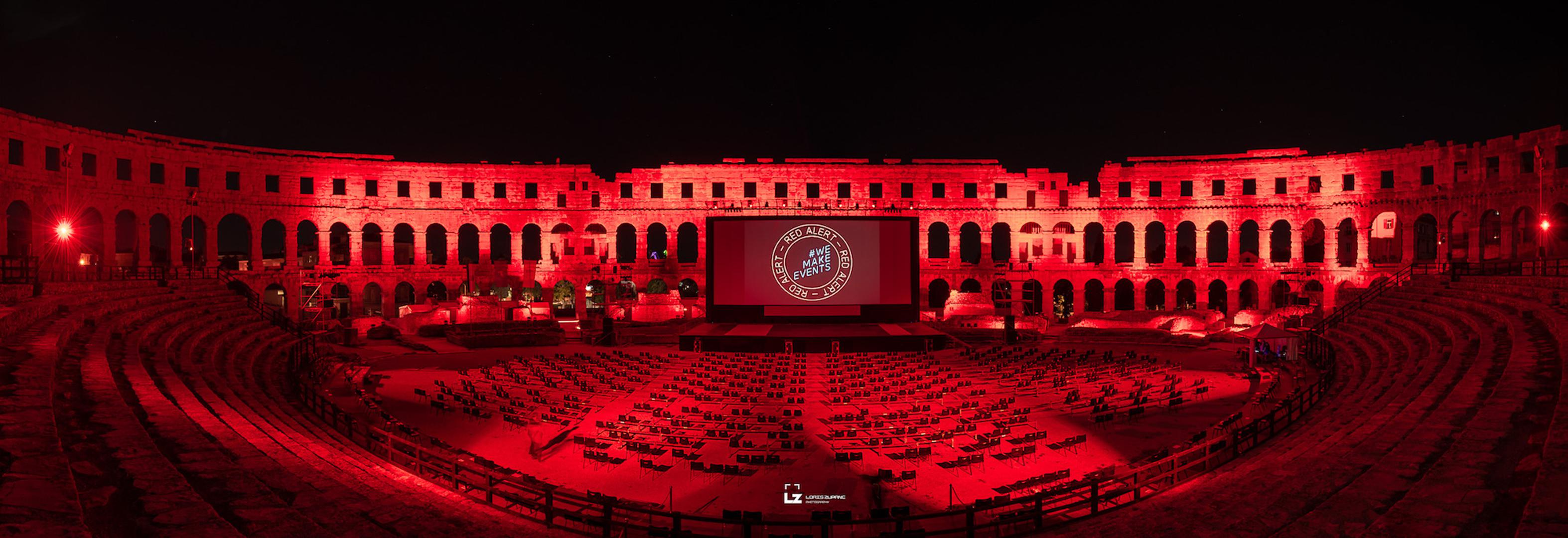
Three of Croatia's most internationally famous venues used by the events industry were lit in spectacular red on Monday. Pula amphitheatre, Zagreb Arena and Fort Punta Christo, also in Pula were bathed in light from sunset until after dark.
Though the change in appearance was enjoyable and visually impressive, the action was undertaken to send a strong message. It was part of a worldwide campaign to highlight the effects of Coronavirus on the events industry and those who work within it.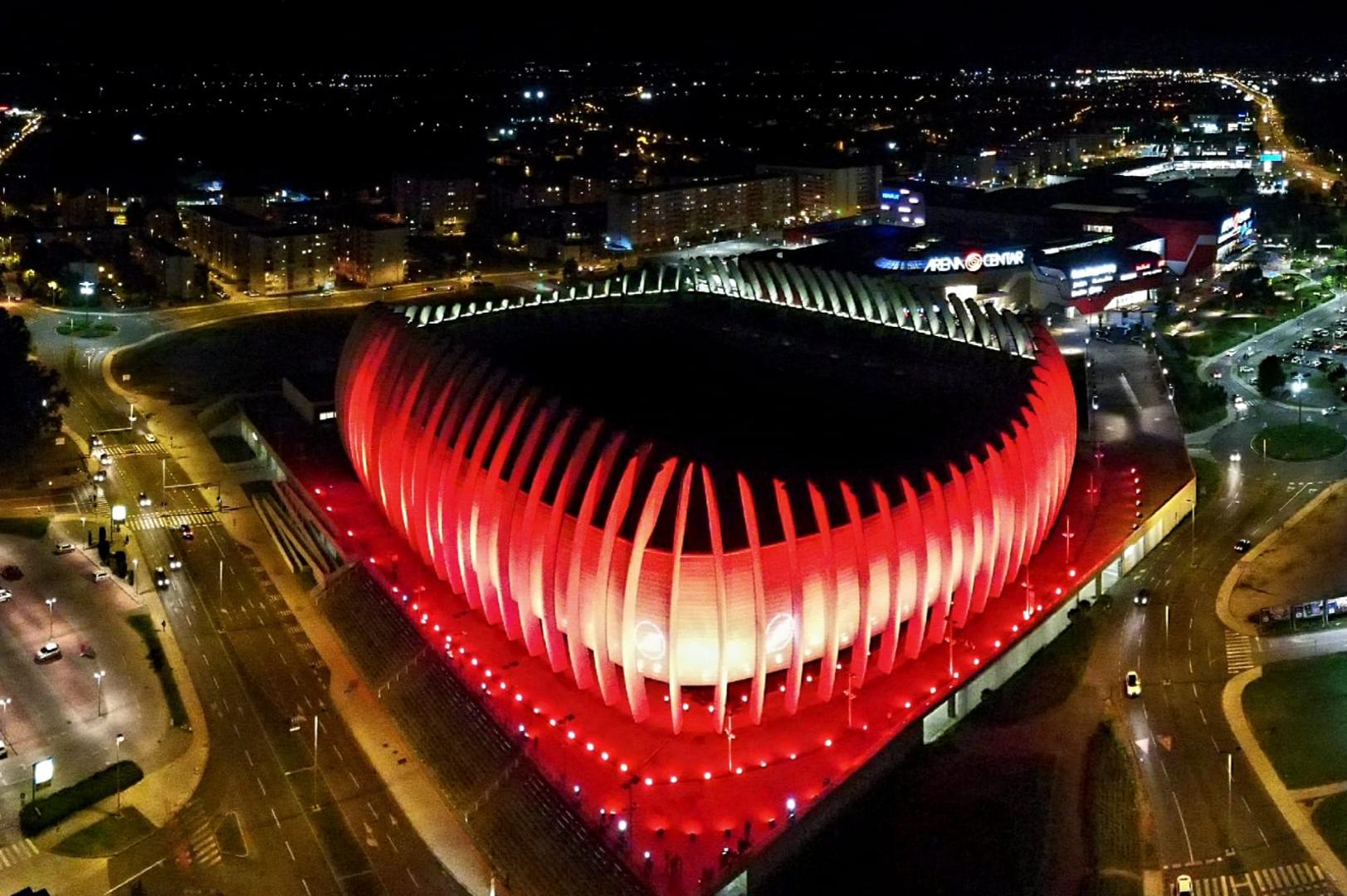
Some of the most famous historical buildings, concert venues and event halls in the world joined the Red Alert campaign and were similarly lit on the same night.
Large public events have been put on hold over most of the world under epidemiological guidelines. Seating arrangements in theatres, conference halls, sports and music halls are simply not compatible with social distancing regulations – many such venues could not make a profit by holding events at 50% capacity.
This has affected millions around the world who work in the events industry, from musicians and performers to technicians, bookers, agents, the media, PR representatives, venue management and general staff. Freelancers operating within the events industry are some of the hardest hit and have had all of their income sources removed completely. Many who operate in the events industry are highly trained and skilled, so diversifying into other industries can be problematic.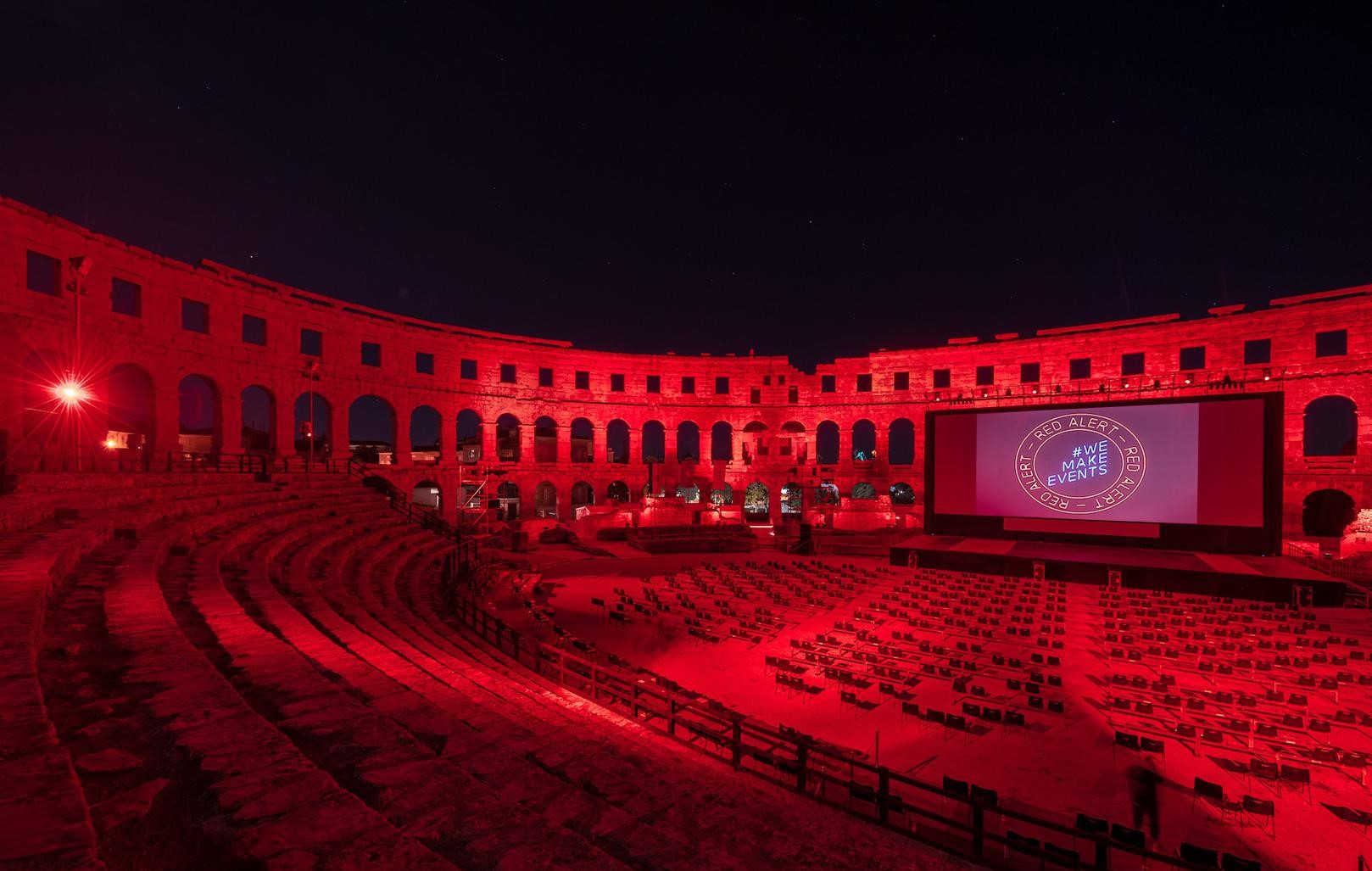
Pula amphitheatre (also known as Pula Arena) is a massively popular open-air venue in warmer months. It holds spectacular opera, ballet and classical music events as well as hosting a film festival. Like Zagreb Arena, it attracts some of the biggest names in pop and rock music. Fort Punta Christo has become famous all over Europe and further over the last decade, thanks to the internationally renowned Outlook and Dimensions festivals. Those events were supposed to take place in Tisno, at The Garden festival site. But, along with seven further festivals due to be held there this year, they chose to cancel in order to safeguard the health of their attendees and locals.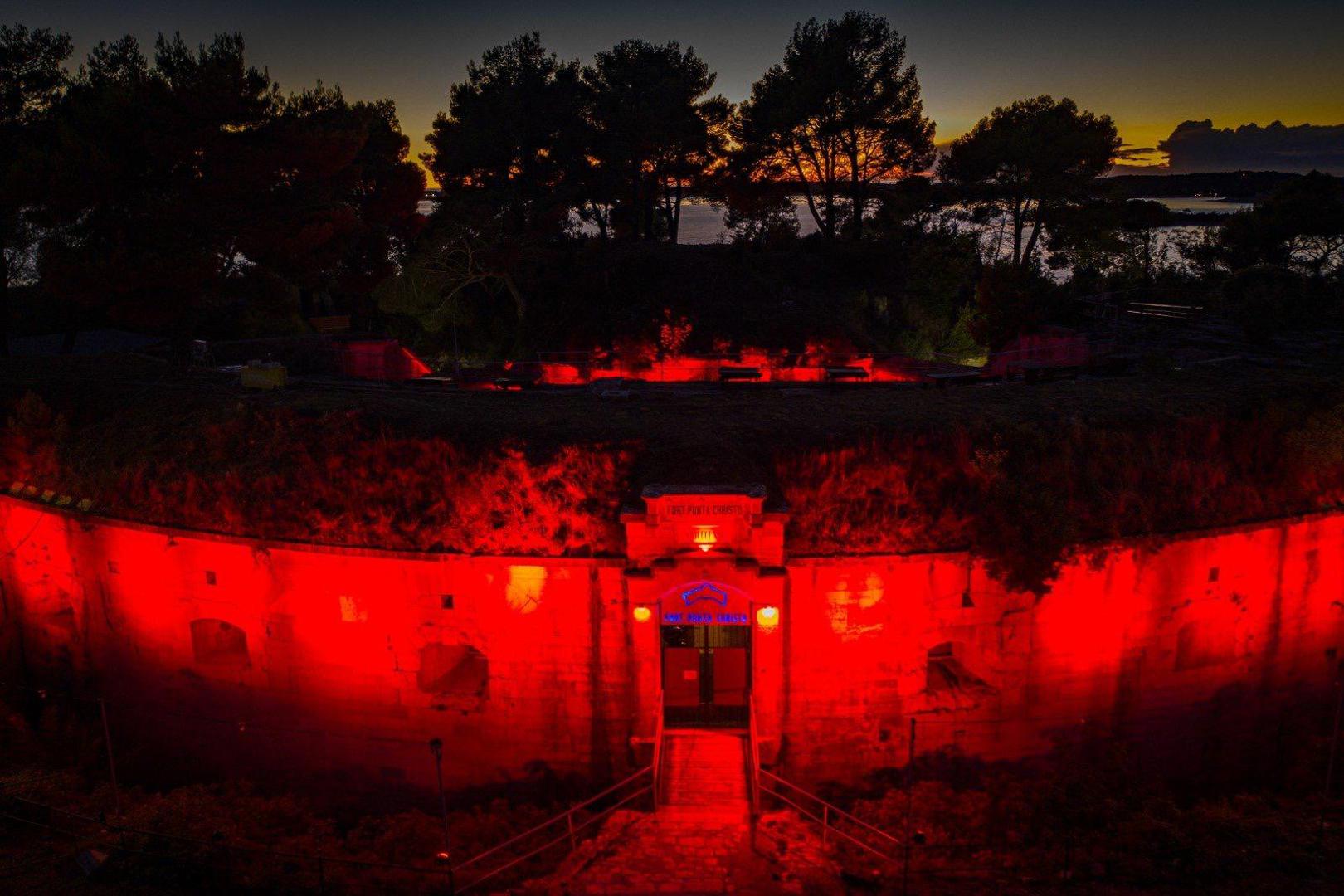
Fort Punta Christo in Pula is widely known as a host site for international music festivals
The Croatian events industry alone is comprised of 2000 business entities, has more than 12,000 employees, and annually generates HRK 4.5 billion. Autumn/winter 2021 is the soonest estimated point at which large scale events could return to normal. The Red Alert campaign has been undertaken to highlight the plight of the events industry as many sections within it face total collapse if deprived of work until then. 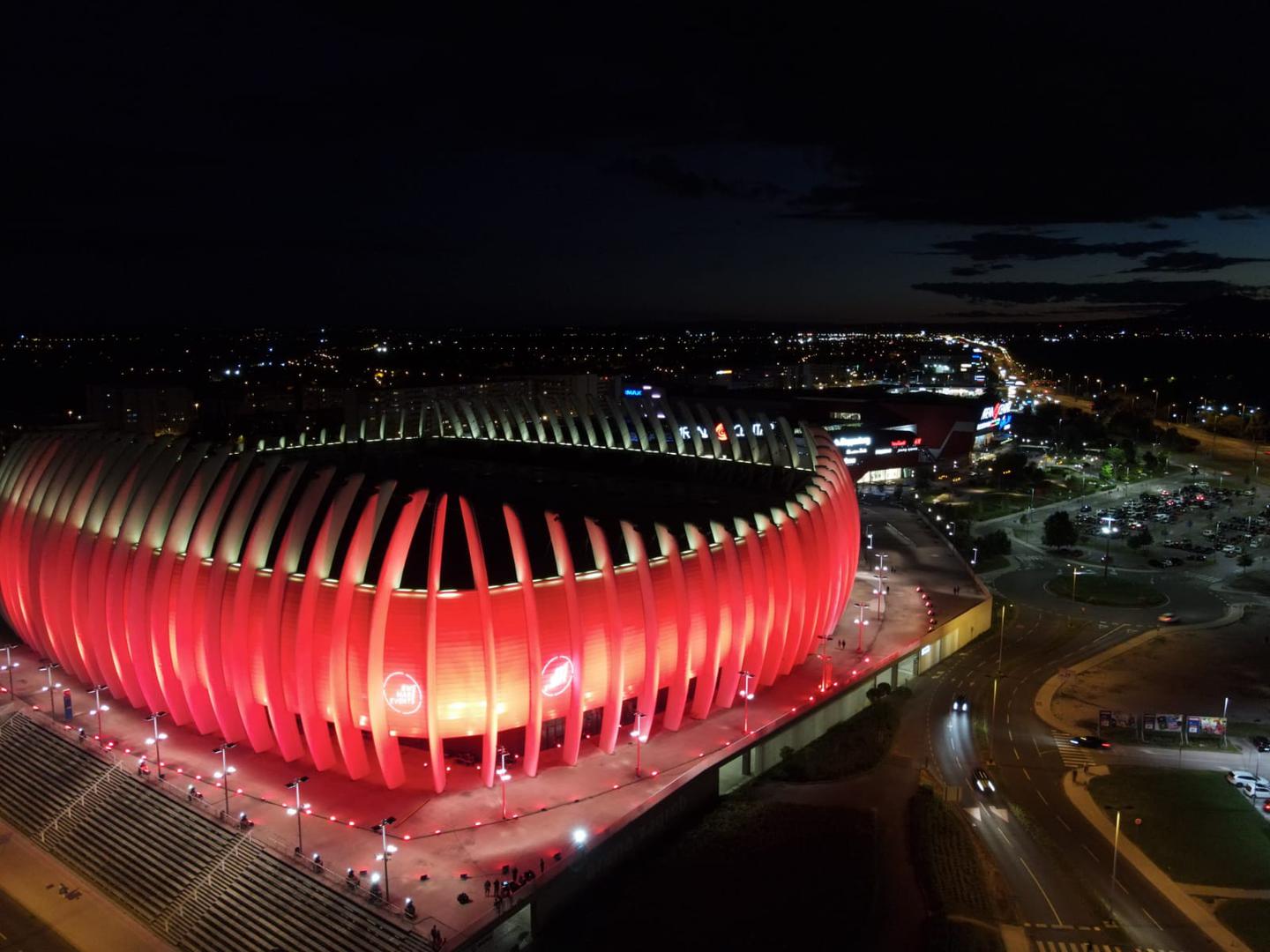
All photos © Red Alert
For the latest travel info, bookmark our main travel info article, which is updated daily.
Read the Croatian Travel Update in your language - now available in 24 languages
Croatian Vet Clinic Warns People to Wear Masks in Funny Way
September the 3rd, 2020 - One Croatian vet clinic has caused a stir and a lot of likely broad grins on social media with its warning to those visiting that they must wear a mask in order to be granted access into the facility.
The way in which we live our lives has been dramatically altered in the wake of the coronavirus pandemic. The newest member of the coronavirus family to have successfully jumped species to humans has dealt a dramatic blow to almost every aspect of normality, and that is without even beginning to delve into the catastrophic economic consequences.
Masks have been a hot topic for many, with some opposing the idea of being asked to wear masks when in certain areas such as shops and other enclosed spaces, and others becoming irritated at the sudden expenditure and the previous difficulty in even being able to find masks to purchase. Still, regardless of the strength of the opinions of some, the requirement to wear masks on public transport and indoors remains in force. One Croatian vet clinic, called Dr. Doolittle, has made sure that those bringing their pets for medical care at least get a laugh in these depressing times.
As Poslovni Dnevnik writes on the 2nd of September, 2020, visitors to the Osijek-based vet clinic were pleasantly surprised by the announcement posted on the door of the practice, so much so that the notice became some what of a hit on social media.
The warning reads: “Please be sure to wear a mask when entering. Thank you! If you don't have a mask, we'll have to measure your temperature, and you know very well how we do it.''
Visitors to this Croatian vet clinic were pleasantly surprised by this announcement, and in addition to being thankful for the expertise of the staff in treating their beloved pets, they also praised their sense of humour in the current, often depressing climate dominated by the virus.
For the latest travel info, bookmark our main travel info article, which is updated daily.
Read the Croatian Travel Update in your language - now available in 24 languages
Did Coronavirus Pandemic Pass Renters of Croatian Luxury Villas By?
As Novac/Barbara Ban writes on the 2nd of September, 2020, while a considerable amount of Croatia's tourism workers remain hooked on what the tourist season was like, fear what might happen in autumn and wonder how they will survive until next Easter, the crisis seems to have bypassed all those involved in renting holiday homes and Croatian luxury villas with swimming pools.
Exactly as expected, this type of accommodation was extremely highly sought after and booked by foreign tourists. A significant number of Croatian luxury villas and other such houses, especially those located in Istria, are still full, despite the fact that some Europeans, including Austrians, Slovenes and Britons aren't bothering coming to Istria because of Croatia's placement on the red lists of these countries. These European guests, along with Germans, make up the majority of guests in the post-season months.
However, only the German market will be able to fill these capacities to some extent, so the renters of Croatian luxury villas and other types of similar accommodation will eventually be able to be satisfied to some degree, as will the agencies that mediate in renting out this type of accommodation.
Ivan Milotic, co-owner and marketing strategist of the My Istria travel agency, which is known for renting the most luxurious houses in Istria, admitted as much. He explained that they have never had such a good level of booking in June as they did this year, which was actually to be expected given the fact that the borders re-opened to the countries from which the largest number of tourists come to Istria. After months of quarantine, everyone could hardly wait for a holiday and their arrival in the then 'coronavirus-free' zone.
''Due to the situation around the closing of the borders with Croatia, in September, we've been at about 60 percent of the occupancy of our houses. The decline started when the Austrians and Slovenes put us on their red lists. In those last 10 days of August, we lost 20 percent of our traffic because those guests packed up and returned home,'' Milotic said. But that doesn’t mean he’s unhappy with a season few expected much of.
''We started receiving our first guests back at the beginning of May, so from June the 15th, after the borders opened, the occupancy of the houses would be 99.9 percent. There are perhaps a few buildings left that have gone too far with their prices, and we have a thousand facilities in our offer. That trend lasted until August the 18th when Austria put us on the red list. From Friday to Saturday that day, we lost 18 percent of our bookings,'' Milotic said. But still, not everyone cancelled. He pointed out that there are guests who turned a deaf ear to these measures and came anyway.
''After that, we've been having an interesting situation because something gets cancelled, but then something also gets booked again. This is a really interesting season,'' Milotic admitted.
''We've adjusted our prices somewhere, depending on the demand. We had a good amount of reservations which took place before the outbreak, but also a lot of reservations after that. In some cases, the prices were reduced by up to 20 percent, but in principle they didn't change that much,'' Milotic pointed out. He explained that after tourism started, it was to be expected that this form of accommodation would be high on people's lists due to the level of isolation, as well as the level of quality.
''We noticed that some guests opted for houses and Croatian luxury villas instead of hotels. Some have even greater comfort than the hotels themselves, but they don't, of course, have the same services. But in this situation the guests were looking for a place to stay where they'd feel safe. The houses and Croatian luxury villas proved to be a complete success,'' he added.
For the latest travel info, bookmark our main travel info article, which is updated daily.
Read the Croatian Travel Update in your language - now available in 24 languages
Dr Krunoslav Capak: Maths Shows Infection Rate Will Drop, We Know When
September the 2nd, 2020 - Dr Krunoslav Capak, a name which has become somewhat of a household one since the pandemic took hold in Croatia, has stated that we can expect a truly significant drop in coronavirus cases, he said that the model being used and the maths involved can even show when that will occur.
Croatia has seen an unfortunate rise in the number of people infected with the new coronavirus over recent weeks, with a number of European countries placing it back on their ''red lists'' and warning their citizens against travel to the country. The United Kingdom and the Netherlands were among the most prominent European nations to do so, along with Germany placing two croatian counties, as opposed to the entire country, on their ''no go'' list.
As Poslovni Dnevnik writes on the 2nd of September, 2020, Dr Krunoslav Capak has stated that there are no new hotspots in Croatia, and that a larger number of those who are already in self-isolation are among the newly comfirmed coronavirus patients.
He also said that a significant drop in the number of newly infected people is expected soon.
''There are certain mathematical models which are used. By entering the data on new patients, the R0 is calculated, as are other parameters, such as the number of infected, mobility… Different models include different parameters.
The model we use in the CNIPH, and we also use other models and utilise mathematicians who make our assessments, have been showing for some time that we have introduced good measures and that our numbers will start to fall. This regards a trend, and doesn't just mean that the numbers will be below 200 or 100.
How much this will be and when it will reach an acceptable level, we're yet to see. The current R0 predicts a decline. These are mathematical models that can be disrupted by new events, hotspots, and unexpected numbers of sufferers, so new numbers need to be inserted into the calculation. We expect a significant decline in mid-September and early October, but I must emphasise that this is if all goes by our model,'' said Dr Krunoslav Capak.
For more on coronavirus in Croatia, follow our dedicated section.
For the latest travel info, bookmark our main travel info article, which is updated daily.
Read the Croatian Travel Update in your language - now available in 24 languages
311 New Coronavirus Cases In Croatia, 4 Deaths In Past 24 Hours
ZAGREB, Sept 2, 2020 - In the past 24 hours 311 new coronavirus cases in Croatia have been registered, bringing the number of active cases to 2,566, while four people have died, the national crisis response team said on Wednesday.
One person died in Dubrava hospital in Zagreb and three in the KBC hospital in Split. They all had other symptoms or were suffering from chronic diseases.
Thirty-three people have been admitted to the hospital in the past 24 hours. Currently, 258 people are being treated in hospital for Covid-19, fifteen of whom are on ventilators, four more than on Tuesday. At the same time, 30 people were discharged from the hospital.
Since the outbreak of the virus in Croatia on 25 February, a total of 10,725 people have been infected with the disease, 191 have died and 7.968 have recovered.
There are currently 8,881 people in self-isolation.
To date, a total of 175,346 people have been tested for the coronavirus, with 4,122 tests carried out in the past 24 hours.
When asked by journalists when fewer new cases could be expected, Capak replied in about a month.
"There are certain mathematical models which, by entering data of new patients and other parameters, population mobility, eg our model, which we use in the HZJZ, but also some other models, show for some time that we have introduced good measures and will the numbers start to fall. This is a downward trend, we can expect a decline soon. These are mathematical models that can always be changed by some new event. But as things stand now, the model shows a significant drop in late September, early October", Capak explained.
For the latest travel info, bookmark our main travel info article, which is updated daily.
Read the Croatian Travel Update in your language - now available in 24 languages
Join the Total Croatia Travel INFO Viber community.
Official Public Health Guidelines, Instructions for Crossing Croatian Border
September 2, 2020 - Crossing Croatian border advice: the latest official recommendations and instructions from the government koronavirus.hr website.
Recommendations and instructions of the Croatian Institute of Public Health for passengers crossing the state border of the Republic of Croatia.
Important note: Valid till 15th of September
The Decision on temporary prohibition of crossing the border crossings of the Republic of Croatia (NN 74/20) prohibits or restricts the crossing of passengers through border crossings, of which are exempt:
- EU nationals (irrespective of their place of residence), the Schengen area and Schengen associated countries, as well as members of their families and third-country nationals who are long-term residents under Council Directive 2003/109/EZ of 25 November 2003 on the status of long-term nationals of third countries and persons entitled to stay under other EU or national Directives or having national long-term visas.
- The temporary prohibition on entry into the Republic of Croatia from third countries, with the exception of passengers referred to in point 1, shall not apply to:
2a) Health care professionals, health researchers and associates, nursing professionals and persons requiring urgent medical treatment
2b) Cross-border workers
2c) Carriers of goods and other transport personnel to the extent necessary
2d) Diplomats, police officers in the performance of their duties, civil protection services and teams, staff of international organisations and international military personnel in the performance of their functions
2e) Transit passengers
2f) Passengers travelling for tourism or other business reasons or having other economic interest, and passengers travelling for the purpose of education
2g) Passengers travelling for urgent personal reasons (e.g. they own a property in the Republic of Croatia) or have any other immediate personal reason
Instructions for the health supervision of passengers entering the Republic of Croatia from third countries:
a) For all passengers entering the Republic of Croatia from third countries, under exemption from the prohibition to cross the border referred to in point 2g, health supervision with 14 days quarantine/self-isolation is mandatory.
Quarantine/self-isolation can be shortened to seven days if a passenger does a nasal and pharynx swab at his/her expense seven days after entering Croatia and gets a negative PCR test result for SARS-CoV-2.
b) The obligation of self-isolation for passengers entering the Republic of Croatia from third countries does not apply to passengers referred to in points 2a, 2b, 2c, 2d, and:
2e) Transit passengers:
- For transit passengers, the border police will, after they have been granted entry, check whether they have left the territory of the Republic of Croatia within 12 hours
- This rule can only be applied if the departure from the Republic of Croatia to a neighbouring country enables it to enter.
2f) – Passengers entering the Republic of Croatia for tourism or other business reasons or having other economic interest, as well as persons travelling for educational purposes.
These passengers may enter Croatia without the obligation of self-isolation upon presentation of a negative nasal and pharynx swab test for SARS-CoV-2, not older than 48 hours (starting from the time of taking the swab until arrival at the border crossing), or with the obligation of 14 days quarantine/self-isolation if they do not have a negative PCR test.
If third-country nationals have a test older than 48 hours when entering Croatia, they will be allowed to enter Croatia, however, they will be obligated to self-isolate and re-test themselves in Croatia at their own expense. The above can be applied to passengers and crew members on yachts. Persons who do not present a negative PCR result are subject to a mandatory 14-day quarantine / self-isolation measure.
Persons who have a negative PCR test, and are on the self-isolation list, whether they’ve been on the list for seven days, as stated in point 2g, or have re-tested themselves in the case they have a test older than 48 hours when entering Croatia, are to be removed from the self-isolation list.
Passengers entering Croatia without the obligation of self-isolation shall comply with the following measures during the first two weeks of their stay in Croatia:
- During the first 14 days after entering the Republic of Croatia, exits from accommodation are limited only to the necessary ones: performance of work if it is a business reason for entering the Republic of Croatia, performance of necessary activities with continuous intensified implementation of hygiene measures.
- During the necessary exit from accommodation it is recommended to use a mask or covers for the nose and mouth, maintain physical distance from other persons (minimum 1.5 meters) and conduct hand hygiene.
- Hands wash as often as possible with warm water and soap and/or use a hand disinfectant that needs to be rubbed in the palms. Avoid touching the face, mouth, nose and eyes.
- Avoid the use of public transport. In a means of transport, it is desirable that a person is alone or exclusively with persons sharing a common accommodation.
- Gatherings should be consistently avoided
- During business meetings it is necessary to meet as few people as possible, ensure a physical distance of 1.5 meters and availability of disinfectants, and avoid unnecessary meetings.
- Payment services are performed by non-cash card payments or on-line services.
- Every morning it is necessary to measure the body temperature if it is higher than 37.2C, the measurement should be repeated after 10 minutes, and if the temperature is higher than 37.2 C it is necessary to stay at home/in accommodation and contact a doctor in a tourist or COVID-19 infirmary or a territorially responsible epidemiologist.
- In case of symptoms of acute respiratory infection (cough, sore throat, fever, short breathing/difficulty or loss of smell), it is necessary to stay at home/in accommodation and contact a doctor in a tourist or A COVID-19 infirmary or a territorially responsible epidemiologist.
- In case of sudden onset of severe, life-threatening symptoms, contact emergency medical service at 194.
For the latest travel info, bookmark our main travel info article, which is updated daily.
Read the Croatian Travel Update in your language - now available in 24 languages
Doctor: Average Age of Coronavirus Dead Ten Years Lower than in First Wave
ZAGREB, September 1, 2020 - The head of the Clinic for Infectious Diseases at the Split University Hospital, doctor Ivo Ivic, said on Tuesday that the average age of patients who died from coronavirus in that clinic was 10 years lower compared to the average age of those who died in the first wave of the epidemic.
"Since June 17, when we can say that the second wave started, 12 patients infected with COVID-19 have died here, and their average age is 73, which is quite unfortunate since that is 10 years lower than the age of persons who died in the first wave, which was 83," Ivic told a press conference in Split.
He also said that there were twice as many deaths during the first wave and that the high average age of those who died then (83 years) was due to the fact that the coronavirus had then spread to nursing homes around Split.
According to doctor Ivic, 155 coronavirus patients have been hospitalised at the Split University Hospital since June 17, their average age is 66, and 65 of them have recovered, while in the first wave there were around 200 coronavirus patients in that hospital and their average age was 72.
He said that the Clinic for Infectious Diseases could currently withstand the number of patients, but it was to be expected that new patients would continue arriving.
He reiterated that he was for fining those not adhering to the epidemiological measures if, he added, there was no other way to achieve behaviour suitable for the "new normal".
We must start living with the coronavirus, we cannot stop life, but we must adhere to the measures of distancing and protection, he underscored.
For the latest travel info, bookmark our main travel info article, which is updated daily.
Read the Croatian Travel Update in your language - now available in 24 languages
What's More Important than Tourism and Coronavirus? Croatian Summer Weddings
September 1, 2020 – Wedding numbers in Dubrovnik-Neretva County have been limited to 50 maximum after a Coronavirus outbreak was traced back to someone's big day. But, who can possibly stop the juggernaut of joy that are Croatian summer weddings?
Epidemiological guidelines can only be followed so far. You can put some extra space between the tables, insist people wear a mask, and aim for the highest standards of hygiene. For all the measures insisted upon by the Croatian state and the sincere efforts of some business owners and their staff, a necessary part of the burden falls on personal responsibility.
People tut and shake their heads in disbelief at the photos and videos of irresponsible Italian youths in the nightclubs of Pag. Others assign blame for Croatia's international safety downgrading on specific regions of Dalmatia and the kind of tourists who visit there. But, there is one homegrown phenomenon which Coronavirus cannot hold back - nor epidemiological measures - and to which no outside blame can be assigned - Croatian summer weddings.
© Pexels
From spring until autumn, the sound of car horns fills Croatian streets each and every weekend. Youths dangle precariously from car windows, the national flag flutters in the air and the strong scent of rakija arrives especially early, even before midday. An occasion of unrestricted joy, of tradition and, usually, extravagant expense, Croatian summer weddings are long in the planning and the fuel for a thousand remembrances. They are automatically dissected after their occurrence, each minute detail compared against the other weddings you have attended.
“They had sarma. In the summertime! And with nothing, only bread. No potato. No rice. Also, there was no fish,” one Dalmatian wedding guest recalled in 2019, after accompanying her husband to a Croatian summer wedding in an agricultural part of the continental region.
“But, surely there was rice in the sarma?”
“Well, yes. But also, the flowers we wore were not as nice as those at my sister's wedding. Her's cost 200 kuna per person!”
Sarma, served in summertime. With no potato! Some details of Croatian summer weddings will never be forgotten © Gurman chef
Everything has to be done correctly. Everyone has to be invited. The seating of guests is given more consideration than the planning of a national counter-attack.
A young couple from Osijek, now residents of Sweden, didn't so much want a traditional affair for their wedding of this year. Both are of an alternative nature. They would have sat miserably through hours of tamburica music. Instead, they wanted similar friends to DJ some music they enjoyed at a more informal gathering, without the compulsion of inviting all the cousins who they only ever see at extended family weddings. A fair request, right? After all, it was their big day, right? Wrong.
Everyone agreed. Except for the bridegroom's sister. She hit the roof “You cannot possibly have a wedding without the tamburica band and all the cousins! We went to ALL their weddings, and gave them gifts! They owe us!”
After ceaseless petitioning to their parents, her demands were eventually met. The parents gave in and refused to pay for the wedding unless it was done correctly. The couple married alone in Sweden, before one witness, who they didn't even know. In Croatia, your big day does not belong just to you. It belongs to everyone in your family.
Nothing can stop this juggernaut of joy. Not poverty nor personal wishes. And certainly not Coronavirus or epidemiological guidelines.
Civil Protection Headquarters in Dubrovnik-Neretva County recently banned 'large' weddings. The maximum number of guests for each wedding is now set at 50. This is in response to an outbreak of Coronavirus in Metković, which stemmed from a wedding held there on 15 August. 38 active cases of Coronavirus were subsequently recorded. And few who've attended a Croatian wedding would be surprised.
Who will try to tell the boys not to drink too much at a wedding, then not to hug or dance with their cousins? Who will tell the godfather of the bride that he must remain distant from his guests, and alone wipe the tears of happiness from his face? This is a day he waited for all of his life.
No wonder, as Slobodna Dalmacija reports in their coverage of the situation in Neretva, that in response to the new limits, Croatian summer weddings are simply now moving across the border into nearby Herzegovina. There, wedding numbers remain unrestricted. No masks will be required to ruin the close group family photos. There probably won't even be anyone stopped on the way back through the border for carrying leftovers. Nor potentially carrying coronavirus.
There is no easy fix to this situation, no simple solution to appease both authorities and celebrating families. We can only hope that the case in Metković is an isolated one and the porous nature of the border with Herzegovina remains the advantage it always has been for Croatians living in the region. For whosoever tries to impede the festivities of Croatian summer weddings is surely fighting a losing cause.
For the latest travel info, bookmark our main travel info article, which is updated daily.
Read the Croatian Travel Update in your language - now available in 24 languages
Croatian Skiers Sue Austria for Resort Chaos - "They Should've Closed Earlier!"
As Poslovni Dnevnik writes on the 31st of August, 2020, what was announced just a few months ago is now coming true. The first hearing on tourist-launched lawsuits against the state of Austria for the coronavirus infection will be held at the Federal Court in Vienna, Austria, on September the 23rd, 2020. A group of Croatian skiers are involved in the matter.
The case regards infection with the new coronavirus at the famous Ischgl ski resort in Tyrol, from where the infection began to spread in late February and during the first weeks of March. The Vienna Consumer Protection Association (VSV) also sided with those who became infected there after receiving about 6,000 complaints.
In the end, a thousand of them from 45 countries declared that they were ready to file a lawsuit according to well known Austrian journalist Peter Kolba, told Slobodna Dalmacija. Nine of them are Croatian skiers.
"At the end of September, we'll have six to eight test cases. These involve victims from Germany, Switzerland and Austria. In two cases, a compensation claim of 100 thousand euros was issued, because in one situation there was a fatal outcome, and in the other the party was connected to a respirator for a long time when in intensive care in hospital, and had to be rehabilitated later on.
We plan to seek justice for other people, including Croats, through a collective lawsuit. As things stand now, however, it will take from half a year to a year for that to enter the court proceedings,'' Kolba explained.
"They should have warned us or closed a week before''
He also said the administration should have warned everyone a week in advance or closed the ski resorts rather than waiting until March the 13th to begin doing so.
"We're suing Austria as a state, because it is the federal minister who is responsible for the health of all people in its territory. This, of course, doesn't diminish the responsibility of the regional authorities in Tyrol, nor that of the municipality in which Ischgl is administratively located, but there were no instructions and strict measures from Vienna. The administration should have warned people a week before or actually closed the ski resorts a week before, rather than wait until March the 13th. That's when the chaos started,'' Kolba said.
He added that not only tourists were damaged by that situation...
"In addition to tourists, we have damaged people who served in hotels there and also fell ill. We plan to represent them as well,'' Kolba said.
Ischgl also announced the start of next season for November the 26th, 2020 last week. How this group of nine Croatian skiers and others fare against the Austrian state is yet to be seen.
For more, follow our lifestyle section.
For the latest travel info, bookmark our main travel info article, which is updated daily.
Read the Croatian Travel Update in your language - now available in 24 languages


